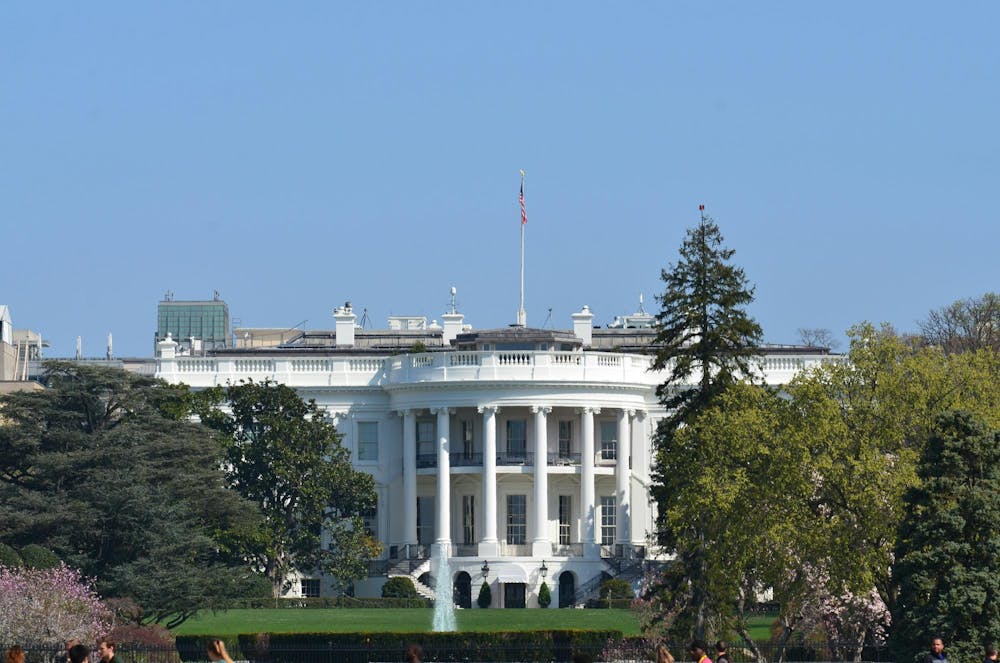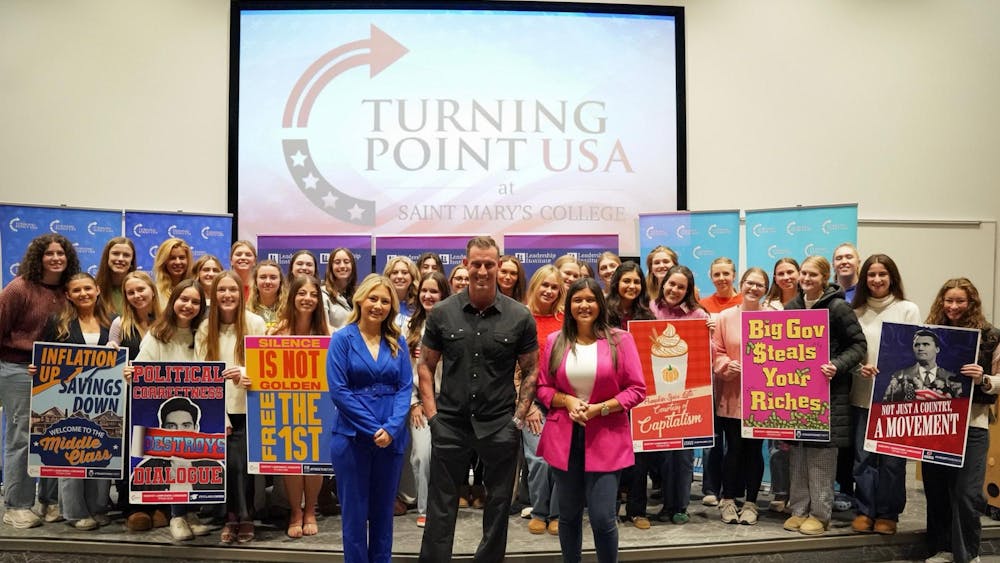President Donald Trump began his inauguration speech by declaring that “the golden age of America begins right now.” Later claiming that “January 20, 2025 is liberation day,” his vision of American greatness echoed throughout the speech and his first executive actions.
Political science professor and director of the Notre Dame Democracy Initiative David Campbell compared this inaugural address to the President’s 2017 speech, noting a “sharp contrast.”
“There was a lot of chaos when he first was inaugurated. The initial executive orders that he issued were met with pretty serious legal challenges, and there was just a lot of uncertainty and chaos at the time,” Campbell said.
This time, Campbell said, Trump has clearly done some planning and established his team, enabling him to make appointments, sign 26 executive orders and issue memorandums and proclamations on his first day. Despite this increased organization, Campbell still expects many legal battles over Trump’s actions in his first days back in office.
“It is clear that he has a much more expansive view of presidential power than he did in his first term in office,” chair of the department of political science Geoffrey Layman shared in an email, adding that during Trump’s first presidency he appeared to take the traditional path of partnering with Congress to achieve his goals.
This time, Layman said, “He has come out of the gates at a blistering pace in using the unique powers of the presidency to implement major components of his agenda ... independently of Congress or other parts of the federal government.”
Political science professor Jeff Harden also noted the significance of Trump's executive orders in an email to The Observer.
“As Congress has become more polarized, [executive orders] have gained an importance because they allow the president to set policy quickly rather than wait for the slow and deliberative legislative process,” Harden wrote. “The swearing in of the new president is, of course, important. But beyond that I think the event takes on elements of media-driven political theater."
To begin the ceremony, senator and chairperson of the inauguration committee Amy Klobuchar gave an address that emphasized the ceremony was “the peaceful transfer of power at the heart of our democracy.”
She suggested the presence of former Presidents Biden, Obama, Clinton and Bush in addition to former Vice Presidents Harris, Pence and Quail and Secretary Clinton presented a commitment to national unity and the promise of these leaders to be faithful to the Constitution.
“In the last four years there are times I’m sure you thought it was very dark, but look what God has done,” said Rev. Franklin Graham during his invocation. “When Donald Trump’s enemies thought he was down and out … Father, you alone saved his life.”
This portrait of Trump’s return as God’s will would return later in Trump’s speech, when he declared: “My life was saved for a reason, I was saved by God to make America great again.” This elicited a standing ovation from the audience.
Layman offered his interpretation of this sentiment.
“To say that the people have been harmed by the corrupt elites who have been in charge and that [Trump] alone has their best interests at heart is classic populism,” he said. “Populist leaders throughout the world say the very same sorts of things. But to say that you were saved by God to save the people from the corrupt elites who are ruining America is taking things to a whole new populist level.”
Trump also emphasized throughout the speech that he will put America first.
In line with his campaign promises, Trump reaffirmed plans to stop “the vicious, violent and unfair weaponization of the Justice Department,” citing his own legal challenges.
His speech and following executive actions have reflected his firm stance on immigration policies. Trump detailed plans to declare a national emergency at the southern border, reinstate the Remain in Mexico policy, send troops to the southern border and end former President Joe Biden’s practice of catch and release. He also moved to designate cartels as foreign terrorist organizations.
After speaking on “an education system that teaches our children to hate themselves and our country despite the love we give them,” Trump maintained that he’ll seek “peace for citizens of every race, nation, religion and creed.”
He linked the inflation crisis to massive overspending and energy spending, declaring “we will drill, baby drill.” He added that America must harness “the liquid gold under our feet,” claiming America must be a manufacturing giant again and continue to lead the world in oil and natural gas production.
He also expressed plans to end the Green New Deal, revoke the electric car mandate and enact tariffs in the weeks ahead.
“The official policy of the United States government that there are only two genders,” Trump said, which also led to a standing ovation. “I will also end the government policy of trying to socially engineer race and gender into everything,” adding plans to create “a society that is colorblind and merit-based.” He noted that these changes would be especially prevalent within the armed forces.
Trump then announced his plans to expand the United States, citing manifest destiny. He claimed that China is operating the Panama Canal and it must be taken back. He added plans to change the Gulf of Mexico to the Gulf of America and give Mount Denali back to its colonial name, Mount McKinley. He plans to “plant the stars and stripes on planet Mars.”
He concluded his speech with an emphasis on American greatness, noting that Americans “ended slavery” and “defeated fascism and communism.”
“We stand on the verge of the four greatest years of American history,” Trump said. “We will not be conquered, we will not be intimidated, we will not be broken, and we will not fail. Nothing will stand in our way because we are Americans and the future is ours.”
Commenting on the recent discourse surrounding Trump’s decision not to place his hand on the Bible while taking his oath of office, Campbell clarified that while presidents have historically done so, the Constitution does not require a Bible to be involved in the ceremony at all.
Reflecting on Trump’s inauguration speech itself, Campbell shared, “I don’t think there was really much that was a surprise,” which he described as a shift away from the first speech.
He noted that in Trump's first inaugural address, his speech on “American carnage” was surprising due to its contrast from the typical rhetoric of inaugural addresses. This time, however, Campbell said the address “was pretty much what you’d expect from Donald Trump. It had a lot of red meat for his base. It used a lot of colloquialisms. You know, rhetorically, this is not a speech that will be remembered as a high point for the American presidency, but that’s sort of generally true of Trump’s rhetoric.”
When asked what the American people should watch for in the coming weeks, Campbell said he would encourage people to pay attention to “what happens to these fault lines within the Trump coalition.”
He explained further, noting the contrast between Trump’s "usual populist base of supporters" who are often critical of large corporations that lean left, and his new coalition.
“He’s surrounded himself with advisors like Elon Musk and Vivek Ramaswamy who come from big business — wealthy people who are themselves the head of large corporations, and it’s not clear that that’s going to be an easy coalition for him to manage,” Campbell said.
Campbell suggested that tensions will arise, noting his typical pattern of “encouraging dissenting views around him and not necessarily taking one side over the other,” and suggested this is something to keep an eye on.
Harden pointed toward compromise as something Americans should pay attention to. “I would suggest considering the role that compromise plays in policymaking. We know from research that compromise is still critical to passing policy, but our polarized public doesn’t always like to see their leaders engage in it,” he said. “In my opinion, supporting compromise both within parties and between parties is an important step in uniting the country, reducing polarization and improving democratic health. So I think the public should look to see if it is a priority for the new administration. If it is not, we may be headed for more of the antagonistic and gridlocked politics that we have seen in recent years.”










